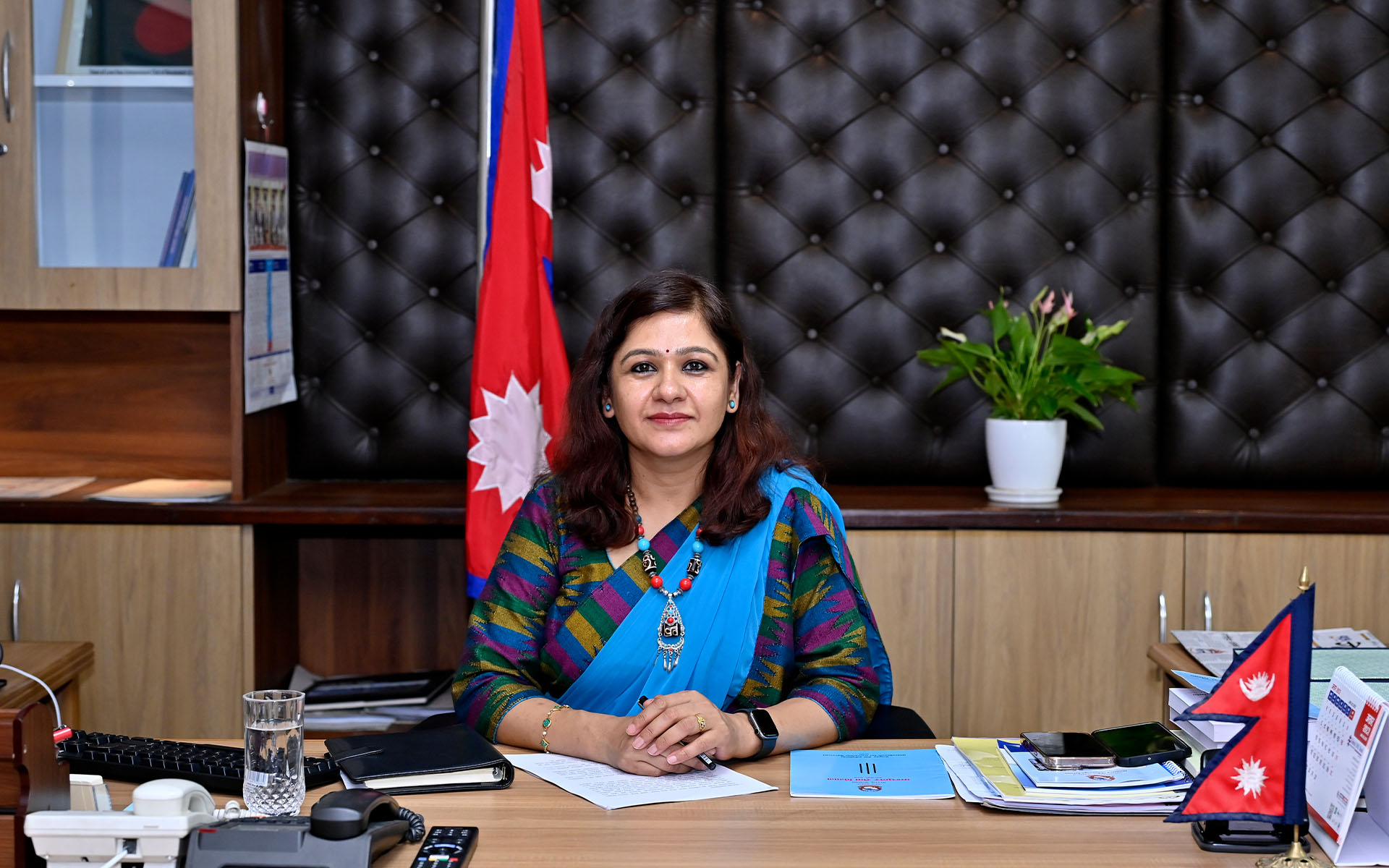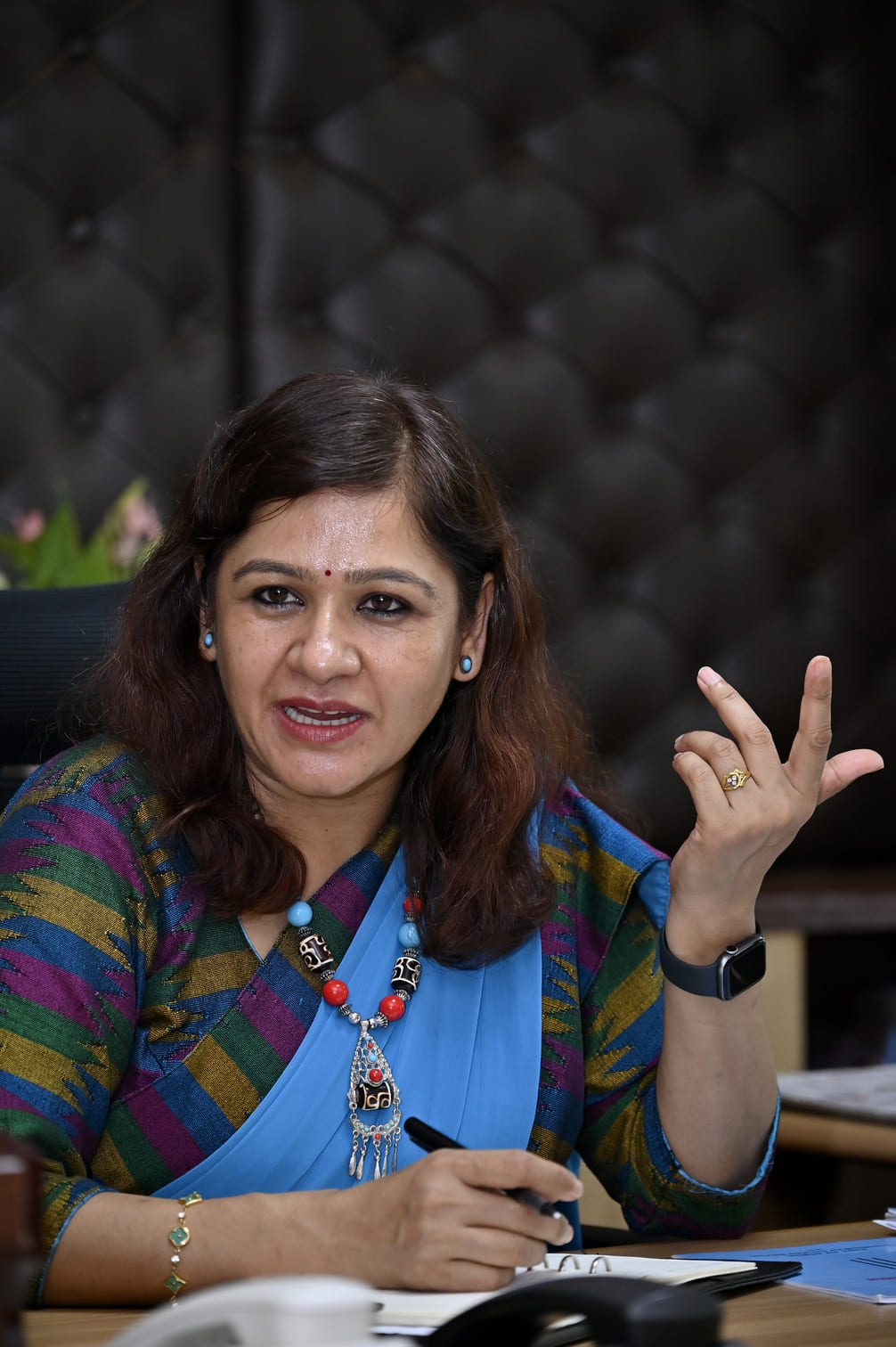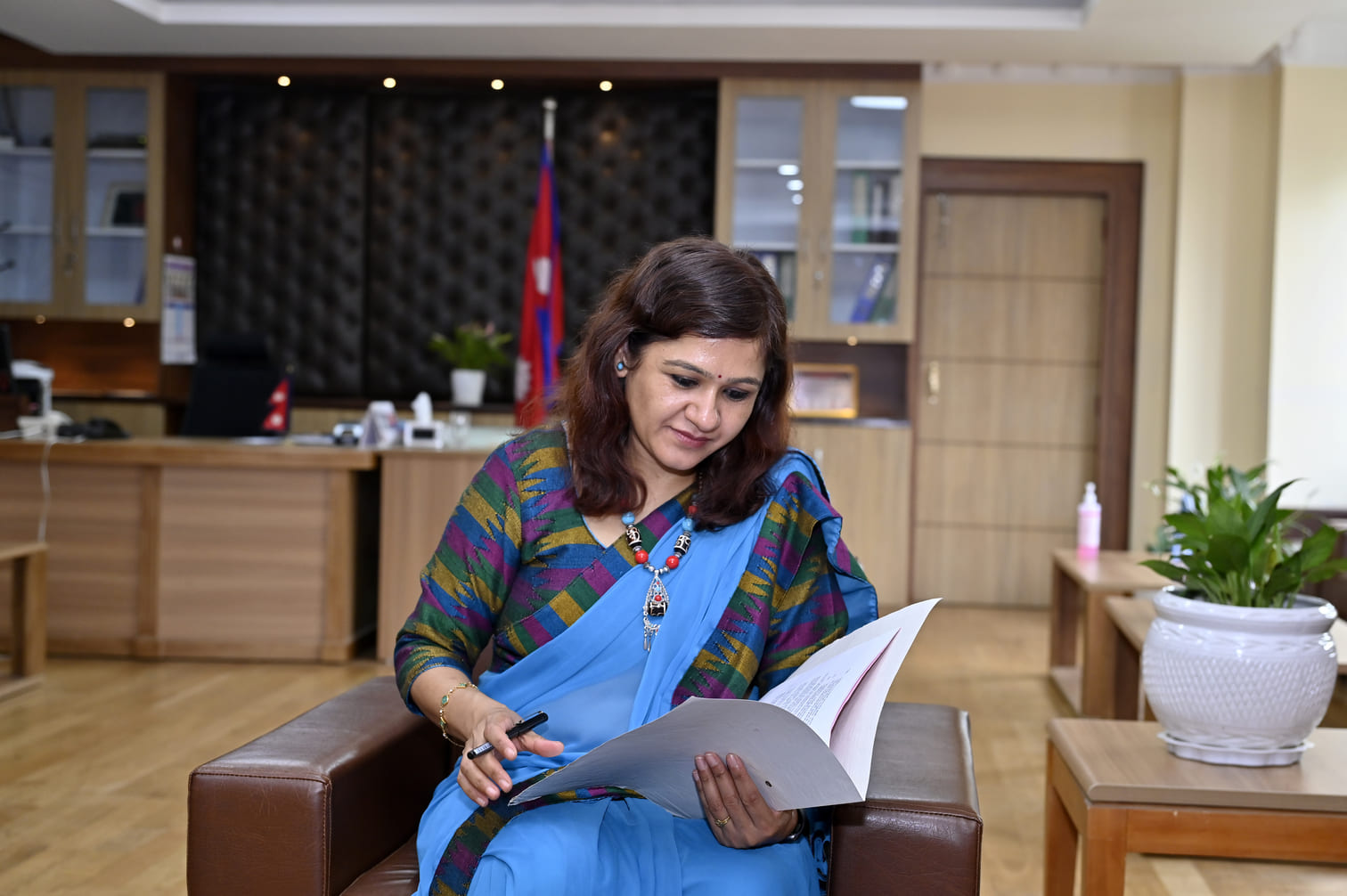

 22.14°C काठमाडौं
22.14°C काठमाडौं

In April 2025, Durapada Sapkota was appointed as the 9th Director General of the Department of Consular Services under Nepal’s Ministry of Foreign Affairs. Concurrently, Joint Secretary Sapkota also made history, becoming the first woman to hold the position.
A career diplomat who joined the Foreign Service in 2010, Sapkota brings over 15 years of experience, both at the Ministry of Foreign Affairs and across its missions abroad. She most recently served as Minister Counsellor (Political) at the Embassy of Nepal in New Delhi, India.
Earlier, she worked in the Ministry’s Central Asia, West Asia, and Africa Division, overseeing issues regarding migration from Nepal to countries in the Middle East. She was also responsible for looking after political and economic matters related to Nepal and the countries in the region.
Sapkota’s prior assignments include serving as Director and Spokesperson at the Department of Passports and, notably, as Chargé d’Affaires a.i./Counsellor at the Embassy of Nepal in Canberra, Australia. As the First Secretary at the Embassy of Nepal in Kuala Lumpur, Malaysia, she closely observed the perils and prospects facing Nepal’s migrant workers.
Throughout her diplomatic career, the Director General has gained extensive experience working in the bilateral, regional, and multilateral affairs division of the Ministry. At present, as the first woman to lead the Department of Consular Services, she continues to serve Nepali citizens both at home and abroad with dedication and a distinct perspective.
To better understand her diplomatic journey, including her experiences, challenges, and responsibilities, and the challenges of being a woman in the foreign service, The Diplomat Nepal sat down with Director General Sapkota for a brief conversation.
1. How has your experience, as the first female Director General of the Department of Consular Services, been so far?
Answer: It’s a great honour and privilege to serve as the Director General at the Department of Consular Services, which has a really broad scope of work. I believe it was the intended decision of the leadership of the Ministry of Foreign Affairs to appoint a woman officer as the department head, as earlier no female had led any department. It has only been two months since I joined the Department, and I’ve found this role to be both exciting and challenging.
I am trying to move ahead based on the foundation laid by my predecessors, while also focusing on improving the service delivery process. Over a thousand people visit this department to get their documents attested on a daily basis, with the department providing various services. There is a new challenge every other day as nothing is predictable. In that sense, the department is also a kind of learning institution. My current focus is on making the service delivery system faster and more efficient, with an aim to gradually move many of our services online.
2. What are the key services that your department provides to the public?
Answer: As the name implies, our department is primarily focused on delivering consular services to Nepali nationals currently living abroad, and to those preparing to go overseas. Within the Ministry of Foreign Affairs, the responsibility of consular service falls under the Department of Consular Services.
Earlier, when consular functions were limited, a section of the Ministry (under the Protocol Division) used to deliver related services. With the increasing number of people leaving for foreign employment, the scope of consular functions has also increased. The Ministry realised the need for a separate institution, especially to protect and promote the interests, rights, and well-being of Nepalis going and living abroad. The Department of Consular Services was thus established in Baisakh 2070 BS.
While talking about its functions/services, we can categorize them into four broad categories:
i. Document Attestation: Personal, educational, legal, commercial, professional, and others.
ii. Legal and Consular Services: Protection of interest and rights of Nepalis abroad, search and rescue in case of missing persons case, facilitation in dead body repatriation/local cremation, compensation, consular and legal assistance to Nepali nationals who are in jail and detention centers, request for release/clemency, and many more associated with labor migration and other issues related with Nepalis abroad.
iii. Diplomatic Exemption (Immunities and Privileges): Facilitation to foreign missions based in Kathmandu for their IDs, visas, vehicles, and other aspects, as well as consular services to foreign nationals in Nepal.
iv. Visa Recommendations: DoCS writes a visa recommendation letter (Visa Note) for the diplomatic and official passport holders (public office holders, including government officials) who are going on official programs/events.

3. What are the major challenges faced by the Department of Consular Services?
Answer: The consular functions have increased with the growing number of people going for education, foreign employment, tourism, and treatment. More than 5 million Nepalis are currently living abroad, of which over 1.5 million are working in the West Asia Region, particularly in the Gulf countries and Malaysia.
Although I do not have the exact figure at hand, it is estimated that over two million Nepalis have gone abroad for foreign employment and unfortunately, more than 75 percent of them are unskilled or low-skilled workers. As such, these migrant workers are facing a host of problems including misinformation, non-payment, underpayment, delayed payment of salaries, physical torture, sexual harassment and exploitation, accommodation, insurance, among others. Although the related diplomatic missions are coordinating to resolve the issues,our department is often the point of contact for their families back home. We also receive requests from the families for immediate rescue, relief, and repatriation of their relatives abroad, including those who have traveled through irregular channels to work as domestic workers.
One of the major challenges that we face is our limited diplomatic representation, and the lack of accurate data and information about Nepalis in destination countries. Inadequate information about their status, and the lack of data on Nepalis in detention centres, prisons or hospitals add to the existing challenges.
We have developed a digital system for streamlining consular services which include demand attestation, search and rescue, issuance of travel documents, attestation verification, and compensation. However, it has not been utilized to the fullest by our respective missions as they are also under pressure due to resource constraints. This makes it harder for us to quickly address the grievances of affected families.
Furthermore, there is still a lack of a genuine coordination mechanism between the institutions involved in labour migration in Nepal. A strong collaboration is much needed in our context because the scale of labour migration has vastly diversified and is heterogeneous in nature. If we had a better integrated system, we could make the process of migration safer, systematic and offer faster, more reliable consular services.
Speaking of other challenges faced by the Department, there are inconsistencies in the documents issued by the local levels that are not uniform in format and language. In some cases, we need to revert the service seekers to the local level to correct errors in their documents. There’s also a widespread misconception that our job is simply to stamp documents but we cannot attest everything we receive. SImilarly, without system integration (API) across government agencies and our department, verifying the authenticity of documents becomes even more difficult.
4. How have you been tackling the challenges to better serve the people?
Answer: What I can proudly say is that I have a very dedicated team here at the DoCS, and all of them have very sincerely imbibed the motto ‘सेवा नै धर्म हो’ (service is our duty) into their work ethic.
I’m also grateful for the leadership and support from the Ministry of Foreign Affairs. The Hon. Foreign Minister has been extremely kind and understanding, and always supportive in every challenge. Our Foreign Secretary, too, has been instrumental in providing us with clear guidance and helping solve issues where challenges arise.
Likewise, we have taken several initiatives to make service delivery fast, accessible, and up to standard. One of our major efforts has been the expansion of our online consular service platform where people can submit applications online and get updated information easily. We have been working with our missions abroad to get real-time information about Nepali nationals that need consular assistance through an online system or other digital means such as WhatsApp or Viber.
Digital tools are being used widely to make service delivery client-friendly. It is to be noted that the police report attestation process is now completely online, a faceless service. Consular services are being decentralized to the local level, replacing traditional physical touchpoints with digital ones.
Documents such as citizenship, passport records are verified through our digital systems. We have set up a toll-free helpline (1152) along with implementing a token system to ensure efficiency and predictability at our service counters.
More importantly, we are also adopting a feminist approach to consular services. “Why so?,” you may ask. This is essential because the number of Nepali women migrating for foreign employment is rising, and unfortunately, so are their vulnerabilities. On the other hand, when their husbands/sons/brothers migrate for foreign employment, women that are left behind suffer in many aspects. I see them come in every day, full of questions and looking for answers which has made us aware that our consular services must also be gender-responsive.

5. As a woman foreign civil servant of Nepal, what do you think should be done to empower more women in the Foreign Service?
Answer: I feel happy to see more and more women entering the Foreign Service in recent years. I can confidently say that they have been doing a wonderful job. As our job is one of the prestigious services where we can represent our nation on global stage, I encourage more women to join the Foreign Service.
Today, there are lots of resources available, access to information has become easier. What is required is hard work and commitment as aspirants need to get through a tough Public Service Commission examination. These aspirants can learn many things from the women who are already serving. As per the provision of the Civil Service Act/Rules, there are reserved quotas under the Civil Service Act, which offer a clear entry point for aspiring female diplomats. Like I already mentioned, I truly wish to see more women in the MoFA, and many of them as ambassadors in the future.
I also believe that think tanks like ‘International Relations and Global Diplomacy Dialogue (IRGDD)’ and platforms like ‘The Diplomat Nepal’ can play a meaningful role by publishing relevant information on international relations, foreign policy, and diplomacy, and encourage and inform young aspirants about what lies ahead.